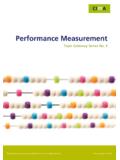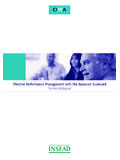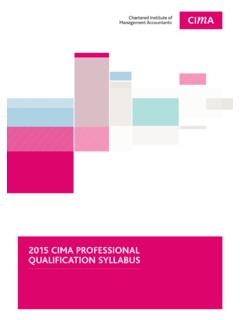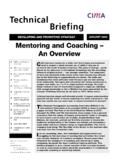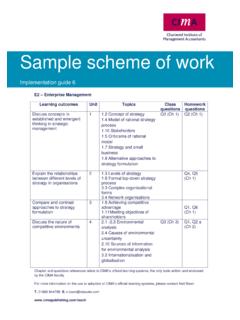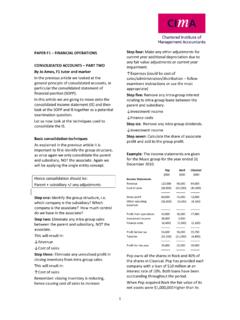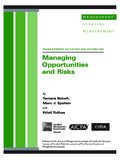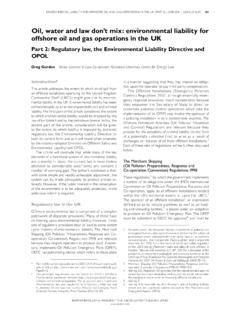Transcription of The Examiner's Answers E1 - Enterprise Operations
1 The Examiner's Answers E1 - Enterprise Operations SECTION A. Answer to Question One A. D. A. C. B. A. C. B. A. A. SECTION B. The Answers that follow in Sections B and C are fuller and more comprehensive than would have been expected from a well-prepared candidate. They have been written in this way to aid teaching, study and revision for tutors and candidates alike. Answer to Question Two Requirement (a). A government could engage in one of several forms of protectionism, including: Import tariffs Import tariffs increase the cost of foreign goods for the consumer, so protecting home competitors whose products appear to be less costly.
2 Import tariffs of this kind account for a third of all protectionist measures according to the World Bank. (One recent example was called 'green protectionism' imposed by certain developed nations and involved imposing new tariffs on imports from countries with weaker carbon emissions reduction targets than themselves. This was seen as being an excuse to make imports from nations such as India less attractive to home markets.). Enterprise Operations 1 November 2011. Regulations When a country's government adjusts regulations such as technical standards or health and safety standards on imported goods and services, possibly for no good reason, protectionism occurs.
3 These governments may claim that such regulation is needed for consumer protection and the impact will be that foreign exporters may find that their products are no longer welcome on technical grounds. Like import tariffs these restrictions act as protective barriers for home producers (assuming that they comply with such regulations). Subsidies A government may offer subsidies for home producers. This may take several forms. Making finance available to local manufacturers more cheaply than commercial rates is one such example.
4 This in effect gives home producers an unfair advantage over foreign producers who would not be able to source finance at such privileged rates and may price their products less competitively as a result. Buying home products only A government may promote domestic businesses by issuing restrictions on purchasing departments they have control over. A requirement upon government departments to purchase only goods produced in the home country may prove more costly for the tax payer but would protect local producers by eliminating some competitors from their markets.
5 Bail outs to struggling businesses Government bail outs that allow unprofitable businesses to continue trading can unfairly protect these businesses against more robust foreign competitors. A recent example was widespread bail-outs by national governments to certain home banks to make sure they do not go into liquidation. Export barriers Governments may recognise the relationship between supply and demand in determining price. When, for instance, food prices rise sharply, major crop-producing countries may restrict exports by home producers.
6 The impact would be to increase supply at home so reducing domestic prices. Requirement (b). Although Corporate Social Responsibility (CSR) does not have a generally agreed definition, most feel it to be a description of ways of integrating economic, social and environmental agendas within organisational activities. CSR therefore might be understood as an organisation's corporate conscience and involves corporate citizenship, social and sustainable practices and its general sense of responsibility, etc.
7 (Some CSR writers refer to honouring the triple bottom line of people, planet and profit). CSR encompasses at least four main dimensions: Economic (the way in which a company is contributing to the development of a local economy in which it operates). Legal (the extent to which a company is restricting its Operations so as to comply with the law). Ethical (approval by society of company's Operations as being 'right'). Philanthropic (the degree of voluntary contributions a company makes to society). When making a business decision, therefore, CSR refers to a firm's obligation to maximise positive and minimise negative impacts upon stakeholders in these main ways.
8 The following are offered by way of example and further explanation Economic. This dimension of CSR involves organisations recognising their responsibility to contribute to the development of economies. A good example is The Body Shop which is actively involved in community trade and against exploitation of suppliers. Through its Community Trade purchasing programme, The Body Shop buys ingredients, crafted items and accessories from marginalised communities around the world in return for a long term relationship based on fair trade.
9 This in turn leads to villages in (say) Africa enjoying healthy returns for natural ingredients they provide and assistance with building and developing facilities. November 2011 2 Enterprise Operations Legal. A key element of CSR is the management of an organisation's relationships with governments and regulatory agencies. It is alleged that in 2010 the oil giant BP and its partners minimised US health and safety regulations, resulting in a massive explosion costing the lives of 10 employees and an environmental catastrophe in the form of an enormous oil leak.
10 If the allegation is correct this implies a failure in respect of this dimension of CSR. Ethical. This dimension centres on how ethical or morally acceptable the Operations of the business are to society. Operations may be legal but may not necessarily be ethical. In this respect sports retailers such as Nike and their supply chain partners have in the past been accused of ethically dubious practices. Practices that could be considered unethical include using forced or child labour, as well as ignoring living and working conditions and safety of the workers.
